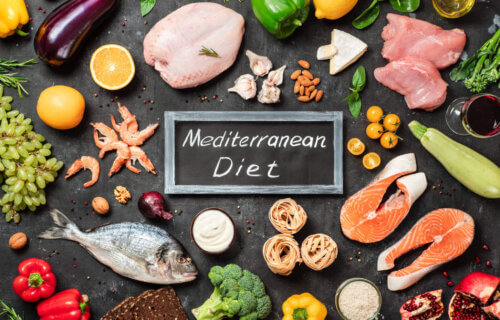SOPHIA ANTIPOLIS, France — A Mediterranean diet has been linked to all sorts of health benefits, especially heart function. Now, a new study reveals men dealing with erectile dysfunction may see a boost in their performance by changing up their dinner menu.
Researchers with the European Society of Cardiology say switching to a Mediterranean diet leads to improvements in both blood pressure and reproductive health among men with hypertension. This kind of diet centers around eating more fruit, vegetables, whole grains, oily fish, and olive oil. Mediterranean diets can include a modest amount of dairy products, but generally limits red meat consumption.
What leads to erectile dysfunction?
Study authors say men with hypertension are twice as likely to have erectile dysfunction in comparison to men with normal blood pressure. Doctors consider erectile dysfunction (ED) to be a disorder of the smaller arteries, which lose their ability to dilate and increase their blood flow.
Dropping testosterone levels during middle age also contributes to weakening sexual performance. Additionally, fitness plays a role in helping men with hypertension survive longer.
With that in mind, researchers find that the Mediterranean diet helps to lower blood pressure and reduce the risk of heart attacks and stroke in people with a higher chance of developing heart disease.
Reversing ED through diet
The study examined the fitness, testosterone levels, blood flow, arterial stiffness, and erectile performance of 250 men with both high blood pressure and ED. Each participant had an average age of 56.
Using questionnaires, the team scored how closely each man stuck to the Mediterranean diet on a scale of 0 to 55. The group also participated in treadmill tests and had their testosterone measured through blood samples.
Scientists used echocardiography to keep track of vascular health and the ability to increase blood flow when necessary. The team also examined the stiffness of each man’s arteries. Higher values on the augmentation index and central pulse pressure mean a person has stiffer arteries. In men, this can increase their risk for erectile dysfunction.
Finally, researchers assessed each participant’s level of ED using the Sexual Health Inventory for Men (SHIM), which uses five questions to measure erectile ability on a scale of 0 to 25. The highest scores mean a man has better erectile performance.
The results of the study show that men with a Mediterranean diet score over 29 had better blood flow and higher testosterone levels. They also displayed better erectile performance, with an average SHIM score above 14 and less arterial stiffness.
Fitness also plays a major role in men’s health
Men with a greater capacity for exercise displayed higher coronary flow reserve and testosterone. Fitter men in the study also stuck with the Mediterranean diet more than others, with scores over 25. As a result, these men also had ED scores over 12 and displayed lower levels of arterial stiffness.
“In our study, consuming a Mediterranean diet was linked with better exercise capacity, healthier arteries and blood flow, higher testosterone levels, and better erectile performance. While we did not examine mechanisms, it seems plausible that this dietary pattern may improve fitness and erectile performance by enhancing function of the blood vessels and limiting the fall in testosterone that occurs in midlife,” says study author Dr. Athanasios Angelis of the University of Athens in a media release.
“The findings suggest that the Mediterranean diet could play a role in maintaining several parameters of vascular health and quality of life and in middle aged men with hypertension and erectile dysfunction,” Dr. Angelis concludes.
Researchers presented their findings at ESC Congress 2021.
